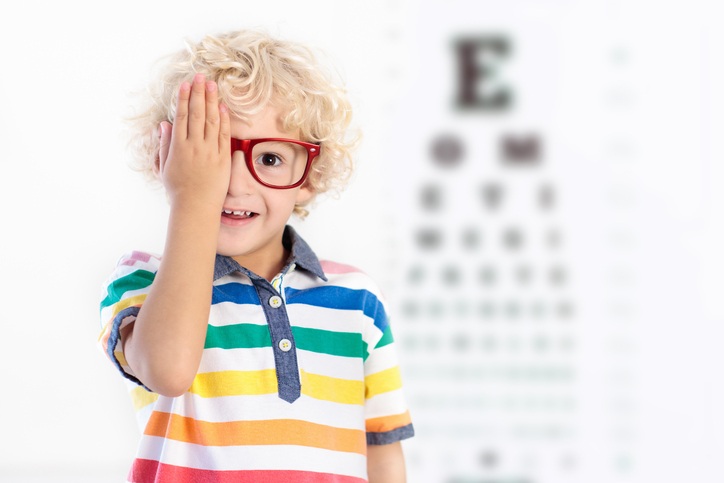Why does every child need a regular eye check up?
Regular eye check-ups are crucial for children as the blue light emitted by phone and tablet screens can be harmful to their eyes.

Good vision is essential to a child’s learning experience and this will be reflected in academic performance. For this reason, it is advisable to arrange an eye examination for your child at the start of the school term.
The blue light from screens has a direct impact on children’s health and commonly causes multiple disorders including headaches, eye strain and sleep disorders. It increases the chances that a child will become astigmatic, myopic or hyperopic in adulthood. While children might wear eyeglasses or sunglasses in regular life, most have no protection from too much screen exposure.
The importance of a professional eye exam
According to research in Canada, only one third of children are examined by an optometrist before entering school, and 61% of the parents surveyed mistakenly believe they can detect their child’s eye problems. The fact is, you can’t always see optical damage without a proper eye examination.
A child’s crystalline lens hardly filters UV and does not filter the blue part of the light spectrum. Therefore, it is important to have an optometrist perform an eye exam so that a child can be fitted for a pair of glasses specifically designed to block the harmful effects of blue light.
Glasses that guard against blue light are available for children, but ask your eye specialist about the types of glasses that will best protect your child’s eyes against light from screens.
RECOMMENDATIONS FROM OPTOMETRISTS AND OPTICIANS
It is important to have a child screened very early for vision problems. Optometrists recommend getting an eye exam for children at the following times, even if there are no signs of an eye problem: • Around 6 months of age • Around the age of 3 • Around the age of 4-5, before entering school

Before the age of 2
According to some studies, before the age of 2, non-interactive screens such as those used for television and DVDs have only negative effects. They can cause visual disturbances, delayed language and a lack of concentration and attention, and should therefore be avoided for children under two years of age.
Between age 2-3
Between 2 and 3 years of age, exposing children to television in a passive and prolonged way and without an interactive, educational human presence is strongly discouraged by optometrists. Of course, the ideal would be not to expose them at all to these screens because, at this age, children need to build skills that require their eyesight, such as working out temporal and spatial guidelines. For that reason, good vision is extremely necessary. From the age of 3, screens help children to distinguish between the real and the virtual. They will be able to copy and imitate what they see. However, they should not spend more than 1 hour per day in front of a screen (all devices combined). Screens are fine, but in small doses.
From 4 to 6 years of age
At about 4 years of age, computers, game consoles and especially (parents’) mobile phones can seem like an occasional casual gaming ‘toy’ for the child – and some parents are happy to keep their child occupied this way for a while – or even as a ‘reward’. However, it is important to keep an eye on a child’s usage time and avoid allowing a child to play alone because at this age, and up to 6 years old,they can easily get addicted to phones and devices addiction – complete with withdrawal symptoms! It is therefore strongly advised to not allow a child to have a personal device before this age. Aside from the addiction qualities and likelihood of potential eye problems, it is between the ages of 3 and 6 that children develop their foundation of manual and sensory skills. Optometrists recommend that children not exceed one hour of screen use per day. They also recommend that parents are there to supervise their child’s use of a device.
From 6 to 12 years of age and older
A child’s social development and confidence in interacting with people should be established between the ages of 6 and 10 years. Spending these years silently hunched over a screen works against this in a big way! From 9 to 12 years of age, children need to explore the world and its complexity. From the age of 12, parents should monitor possible night time screen use because it can be harmful for their eyes in both the short and long term, as well as interfering with a child’s sleep. Excessive use of screens and especially the Internet can lead to ‘flashing’ thoughts that are too fast, superficial and fluid. This reduces a child’s memory as well as causing drowsiness, concentration issues and eye problems.
The impact on eyes
If your child has been spending their summer break immersed in watching movies, talking with their friends a lot or gaming on a phone or tablet device, the number one thing the child needs at the start of the new school term is an eye examination to help establish the effects of too much screen use.
There are also some signs to consider if your child spends a lot of time in front of screens in general. For example, if they blink too often, this may be due to dryness that is often caused by screens. To protect eye health, an optometrist should be consulted for an eye exam to enable any corrective action that may be necessary to restore good eye health.
SCHEDULING REGULAR EYE EXAMS FOR CHILDREN
Young people need to have an eye examination every year, between the ages of 6 and 23. From the age of 6, a child’s eye exam is very similar to the one adults are given. When a vision problem is diagnosed, the optician is in a position to correct the issue and likely prevent further damage.












Comments